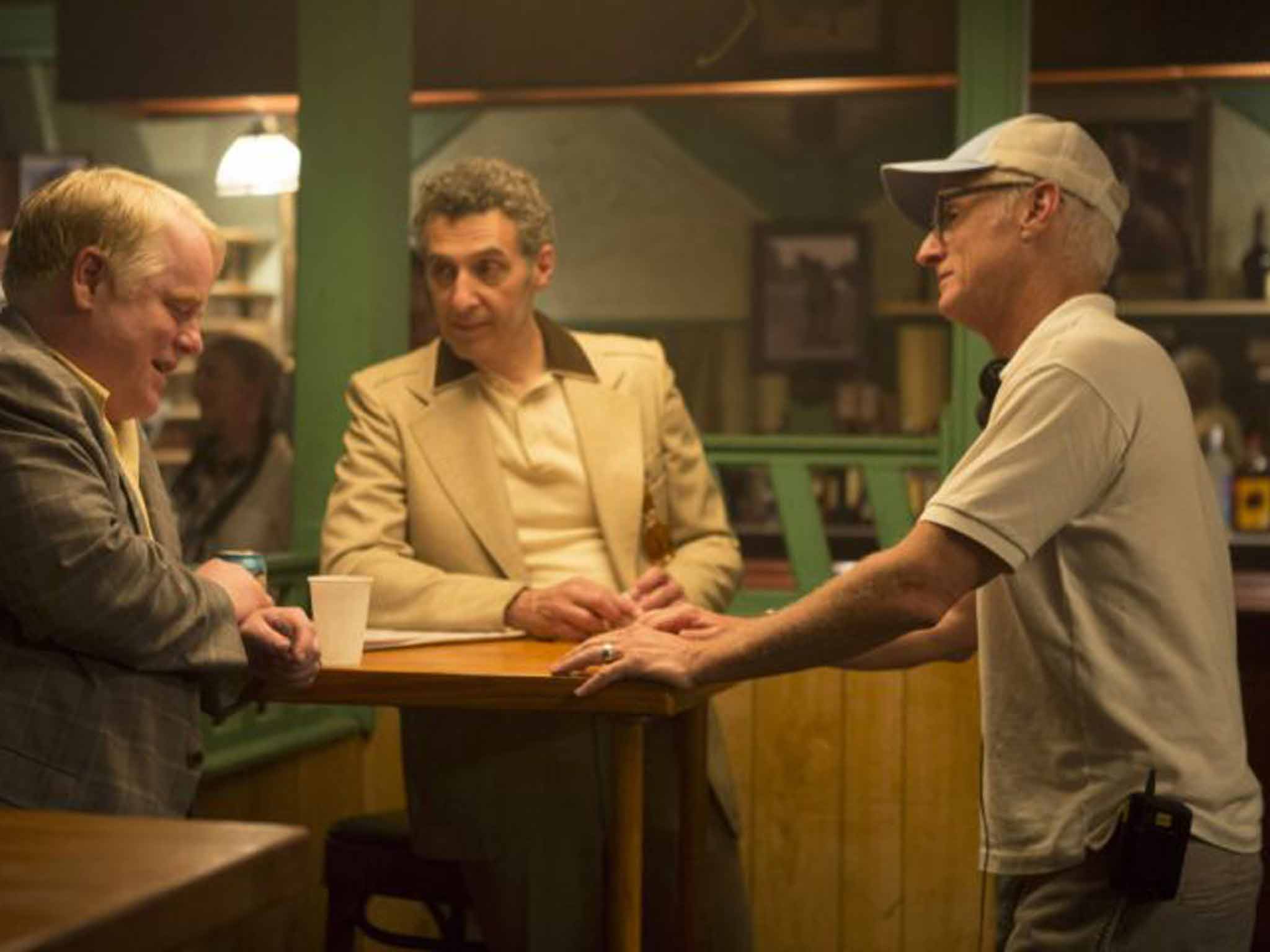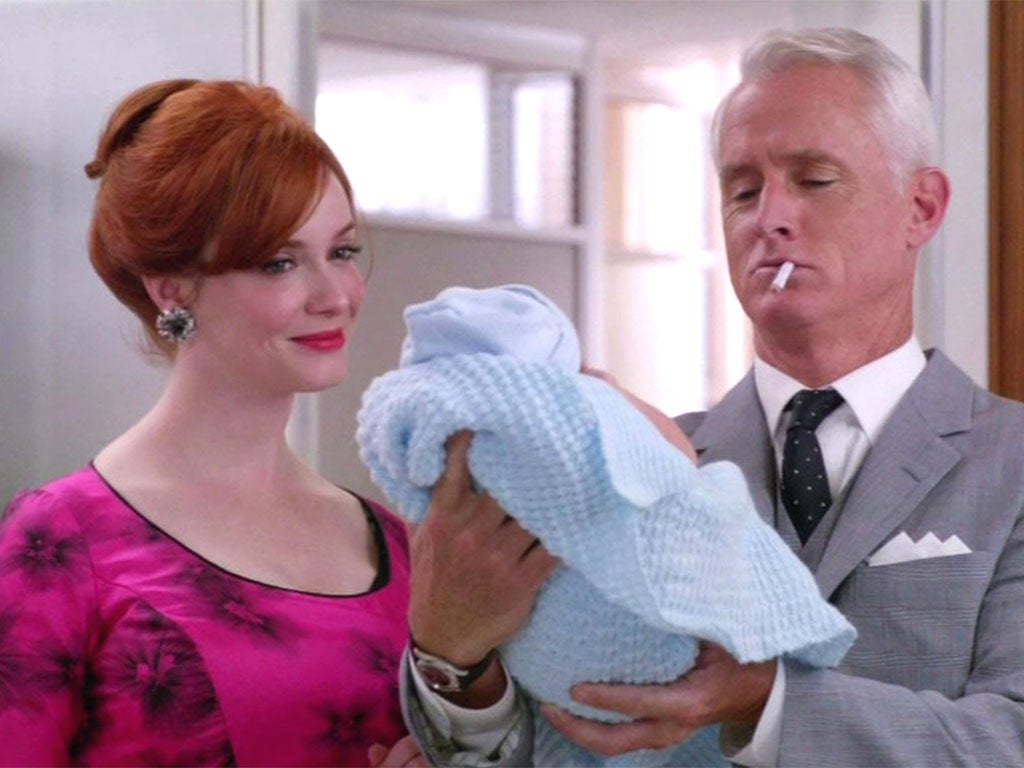John Slattery: From 'Mad Men' to 'God's Pocket'
After saying a teary farewell to 'Mad Men' and directing his first feature film, John Slattery tells James Mottram that he is now revelling in his new-found freedom

Your support helps us to tell the story
From reproductive rights to climate change to Big Tech, The Independent is on the ground when the story is developing. Whether it's investigating the financials of Elon Musk's pro-Trump PAC or producing our latest documentary, 'The A Word', which shines a light on the American women fighting for reproductive rights, we know how important it is to parse out the facts from the messaging.
At such a critical moment in US history, we need reporters on the ground. Your donation allows us to keep sending journalists to speak to both sides of the story.
The Independent is trusted by Americans across the entire political spectrum. And unlike many other quality news outlets, we choose not to lock Americans out of our reporting and analysis with paywalls. We believe quality journalism should be available to everyone, paid for by those who can afford it.
Your support makes all the difference.It's strange what one role can do for an actor. John Slattery's career had been bubbling away quite nicely for two decades when along came Roger Sterling and Mad Men. The hard-drinking, razor-tongued ad exec, who seems to rival the show's oil-slick lead Don Draper when it comes to notches on the bedpost, Sterling turned the white-haired Slattery from perfectly respectable jobbing actor into belated sex symbol, even while he once claimed "women aren't throwing themselves at me on the street".
Today, Slattery is sitting in the office of a London PR firm, the table between us piled with cookies, croissants and crisps. "All the heart attack foods," he smiles, not touching a thing. About to turn 52 next week, he's slim and wiry – he still loves to surf – and spurns the louche Roger's liquid-lunch lifestyle. Dressed in indigo jeans, black-rimmed glasses and a long-sleeved pale-blue shirt, he's more smart than casual. You imagine he fits in rather well in the Hamptons, where he now spends much of his time.
He looks like a man who has a handle on the way Mad Men turned his life upside down. Is he glad it didn't happen to him in his twenties, when fame might've derailed him? "I don't think it's so much that, but you appreciate it. I think as you get older you appreciate things you didn't when you were young. Just because you've got more experience. You have a way to compare things to earlier experiences. I'm glad it happened now... all of us have been afforded opportunities we wouldn't if Mad Men didn't happen."
On the surface, Slattery looks busier than ever. With Mad Men's seventh and final season currently on pause until it resumes for the final episodes next spring, he's in town to promote God's Pocket, his directorial debut. But in truth he's at a loose end.
"This is the first time I've had nothing to do since I can remember. I've finished shooting, the TV show is done, the movie is done... I'm a bum! It's perfect. I love it. It's the greatest thing. I don't know how long it will last."

It certainly makes up for the time he was squeezing the shoot for God's Pocket into the six-month window he had between seasons six and seven of Mad Men. "I'm not a great scheduler, as my wife will tell you!" he laughs. Adapted by Slattery and Alex Metcalf from the novel by Pete Dexter (the author behind The Paperboy and Paris Trout), it's a downbeat tale set in the blue-collar Philadelphia community of the title. Like they're auditioning for a Charles Bukowski novel, characters spend most of their time snarling into empty tumblers at the local fleapit boozer.
While there's not a martini in sight, Slattery claims he didn't pick up on Dexter's novel simply because it was about as far removed from the chi-chi bars that Roger inhabits on Madison Avenue. "I didn't consciously say, 'I've got to find a different world to explore.' I think because the Mad Men world is so specific, it's not that hard to find worlds that aren't that. But I don't know... I think Roger Sterling would walk into that bar and appreciate it. Whatever it takes to get the drink drunk."
The film stars Philip Seymour Hoffman, in one of his last roles before he died earlier this year from a heroin overdose. He plays Mickey Scarpato, barely keeping the family together when his repugnant stepson is killed in a fight at work. Slattery, who shared a small scene with Hoffman in 2007's Charlie Wilson's War, has known him for years. "Phil was someone whose career I always wanted. You get asked that question: whose career would you have if you could? I always thought he made the most interesting choices."
Slattery was so taken with Hoffman playing Mickey, he even waited a year to shoot so schedules could align. I tell Slattery that it seems so strange, that after his film, Anton Corbijn's upcoming A Most Wanted Man and the next Hunger Games movie, there will be no more films featuring Hoffman. "Yeah," he nods, "What he has to offer as an artist... it's tragic and that's all there is. You see it in everything he does, how perfectly suited he was to do what he did."

Watch Apple TV+ free for 7 days
New subscribers only. £8.99/mo. after free trial. Plan auto-renews until cancelled

Watch Apple TV+ free for 7 days
New subscribers only. £8.99/mo. after free trial. Plan auto-renews until cancelled
While Slattery had directed several episodes of Mad Men – and here casts the show's resident redhead Christina Hendricks, as Mickey's wife – he'd never harboured serious ambitions to make a feature. "I didn't expect to have this experience," he admits. It was only after he encountered Dexter's book a decade ago, and doggedly pursued the rights, that he thought about making the leap.
Admittedly, a blackly comic story that sees Mickey's week go from bad to worse, as he gambles away the money for his son's funeral, may not be to all tastes. But it was the humour, in the bleakest of situations, that kept Slattery interested. "The humour... gave everyone hope. There are worse existences than living in God's Pocket, and people know that. It's not Paris but there are a lot worse places. It's a neighbourhood. For all the things they say, no one leaves."
Slattery's own upbringing was in Boston, part of a large Irish Catholic family, with five brothers and sisters. With his father a leather merchant and his mother an accountant, Slattery grew up in an era when television was king. "I would stay up all night watching television," he says. "I would literally stand in front of the television because I was so hypnotised! I wouldn't even back up and sit down. I would get the remote, and three hours later I'd be standing there with my coat on!"
While his tastes ranged from Mary Tyler Moore to Preston Sturges, it was seeing Derek Jacobi in both I, Claudius and his 1980 BBC-produced version of Hamlet that turned him on to the possibilities of acting. After majoring in theatre at the Catholic University of America in Washington DC, he then moved to New York – working as a waiter and a limo driver as he joined the endless carousel of auditions. It wasn't until his mid-twenties, however, that he landed his first gig, in a TV spin-off series of The Dirty Dozen.
"I was in LA and I'd run out of money," he recalls. "I had literally returned the rent-a-car – to Ugly Duckling Car Rental. I was walking back thinking, 'Now what will I do, I don't have a car and I live in LA?' The only phone number I had was for my cousin's bar – there were no cell-phones, it was 1987 – and my brother came out of the bar and told me I'd gotten the job, the Dirty Dozen."
For the next two decades, there was steady work – in 1996 alone, he had bit-parts in three films, starring Al Pacino, Robert De Niro and Arnold Schwarzenegger respectively – but it was only when he played Carrie Bradshaw's sleazy politician boyfriend in Sex and the City that he got noticed. Film roles, in Mona Lisa Smile and Flags of Our Fathers, followed, along with a part as the aspiring mayor in the final two seasons of Desperate Housewives.
Then it all changed with Mad Men. Slattery famously auditioned for Don Draper first, but wound up as Roger. Seven years, and four Emmy nominations later, it's all about to end. So he knows what happens? He nods, but refuses to say a word. "I'm used to knowing and not saying anything," he smiles. But how did it feel to wrap the show for good? "It was sad. I knew it would be. Like most things, emotional events like that, you expect they'll hit you one way and then they hit you another way. It didn't. It got very emotional. It hit me when I wasn't looking."
Tears aside, Slattery is now revelling in the time that being free of the show's shackles affords. Married since 1998 to actress Talia Balsam (who was previously wed to George Clooney, and – in a neat twist – plays Mona, Roger's first wife, in Mad Men), they have a 15 year-old son, Harry. He and Slattery like to spend their downtime watching films. "I think his tastes are actually advancing. [Wes Anderson's] The Grand Budapest Hotel, we saw together, and loved it."
As new chapters go, he's champing at the bit. You won't find him angling for a life on the golf course. "As much as I will miss Mad Men, I didn't get into this to play the same character for the whole time," he says. "At some point, you have to do something else. And that's the exciting part. But it's also the part where you go 'Now what am I going to do?' I think it's foolish to try and top something like that." He reflects for a second. "The possibility is what you want. Now I'm nothing but possibilities."
'God's Pocket' opens on Friday
Join our commenting forum
Join thought-provoking conversations, follow other Independent readers and see their replies
Comments